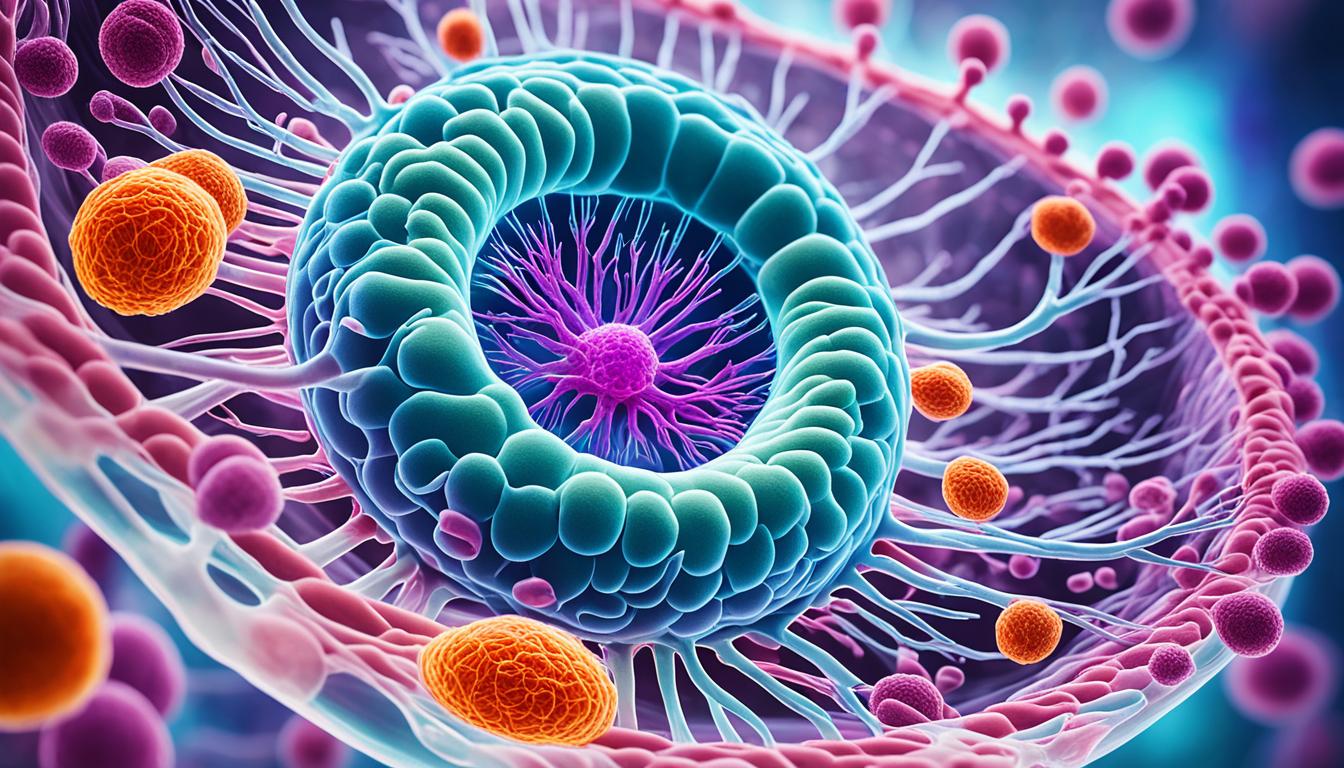Malignant hyperthermia is a severe reaction that can happen with some anesthesia drugs. People who react this way may have muscle stiffness, a high fever, and a fast heartbeat. This can lead to life-threatening issues like rhabdomyolysis and too much potassium in their blood. About 1 in 30,000 people have this reaction to certain anesthesia drugs.
By doing genetic tests, doctors can find mutated genes linked to this condition. Knowing this helps plan the best treatment. The first step in treating malignant hyperthermia is giving a drug called dantrolene. This medicine cools the body and relaxes muscles.
Supportive treatments like using ice, cooling blankets, and IV fluids also help a lot. Recently, using stem cells to treat this condition has shown promise. Stem cells can repair damaged muscles and boost their function. Even though it’s at a research stage, the approach offers a lot of hope for the future of treating malignant hyperthermia.
Key Takeaways:
- Malignant hyperthermia is a serious reaction to certain drugs used in general anesthesia.
- Common symptoms include muscle stiffness, malignant fever, and rapid heart rate.
- Complications can be life-threatening, such as rhabdomyolysis and high blood potassium levels.
- Genetic testing can identify mutated genes associated with malignant hyperthermia.
- Prompt treatment with dantrolene and supportive care measures are crucial for managing the condition.
- Stem cell therapy shows potential as an innovative treatment for malignant hyperthermia, with the ability to regenerate damaged muscle tissue.
Symptoms and Diagnosis of Malignant Hyperthermia
Malignant hyperthermia is rare yet life-threatening. It may happen during general anesthesia. Recognizing its symptoms and diagnosis is key for quick treatment and avoiding issues.
Symptoms of Malignant Hyperthermia
The main symptoms of this condition are:
- Dangerously high body temperature: Your body temperature may shoot up quickly to risky levels if you have it.
- Severe muscle spasms: You might notice muscle stiffness and spasms. These are common signs of malignant hyperthermia.
- Rapid heart rate: People facing this condition often have a fast heartbeat.
These signs usually appear after taking certain anesthetics like halothane or succinylcholine. It’s key to know that symptoms might not show up at first but can later, especially after surgery or heavy activity.
Diagnosis of Malignant Hyperthermia
Diagnosing it includes a clinical check-up, genetic tests, and muscle biopsies.
A doctor will look at your symptoms and past to check if you might have malignant hyperthermia. If you have a family history or reacted badly to anesthesia before, you’re at higher risk.
They might suggest genetic tests too. These can show if you carry certain genes linked to this condition. It can help confirm the diagnosis and figure out the risk for your family.
In some cases, a muscle biopsy might be needed. This involves taking and checking a small piece of your muscle. It helps rule out other conditions and support the diagnosis.
Spotting it early is crucial. It means getting treatment fast with a drug called dantrolene. This medicine helps relax muscles and cool down your body. If you know you might get this during surgery, be sure to tell your doctor. This way, they can take the right steps to keep you safe.
With careful watch and quick help, the outlook for those with malignant hyperthermia can be good. Knowing the signs and getting a proper diagnosis in time are essential for a good recovery.
Causes and Innovative Treatments for Malignant Hyperthermia
Mutations in the RYR1 or CACNA1S genes mainly cause malignant hyperthermia. These changes can be passed down from parents or happen randomly. It is usually linked to other muscle diseases. Quick treatment is key to avoiding serious risks. Dantrolene is used to relax muscles and reduce body heat. Other steps like ice packs, cooling blankets, and IV fluids help too.
Stem cell therapy is a new and exciting way to treat malignant hyperthermia. Stem cells can repair damaged muscle and boost muscle function. This could significantly help those with the illness, improving their life quality. Stem cell therapy for malignant hyperthermia is still being studied. But, it shows a lot of promise for the future.
Malignant hyperthermia is mostly caused by genetic issues. Fast treatment with dantrolene and supportive care is crucial. Stem cell therapy presents a new and hopeful treatment method. It could lead to better care for this dangerous condition. Ongoing research in this area suggests a brighter future for treated patients.

